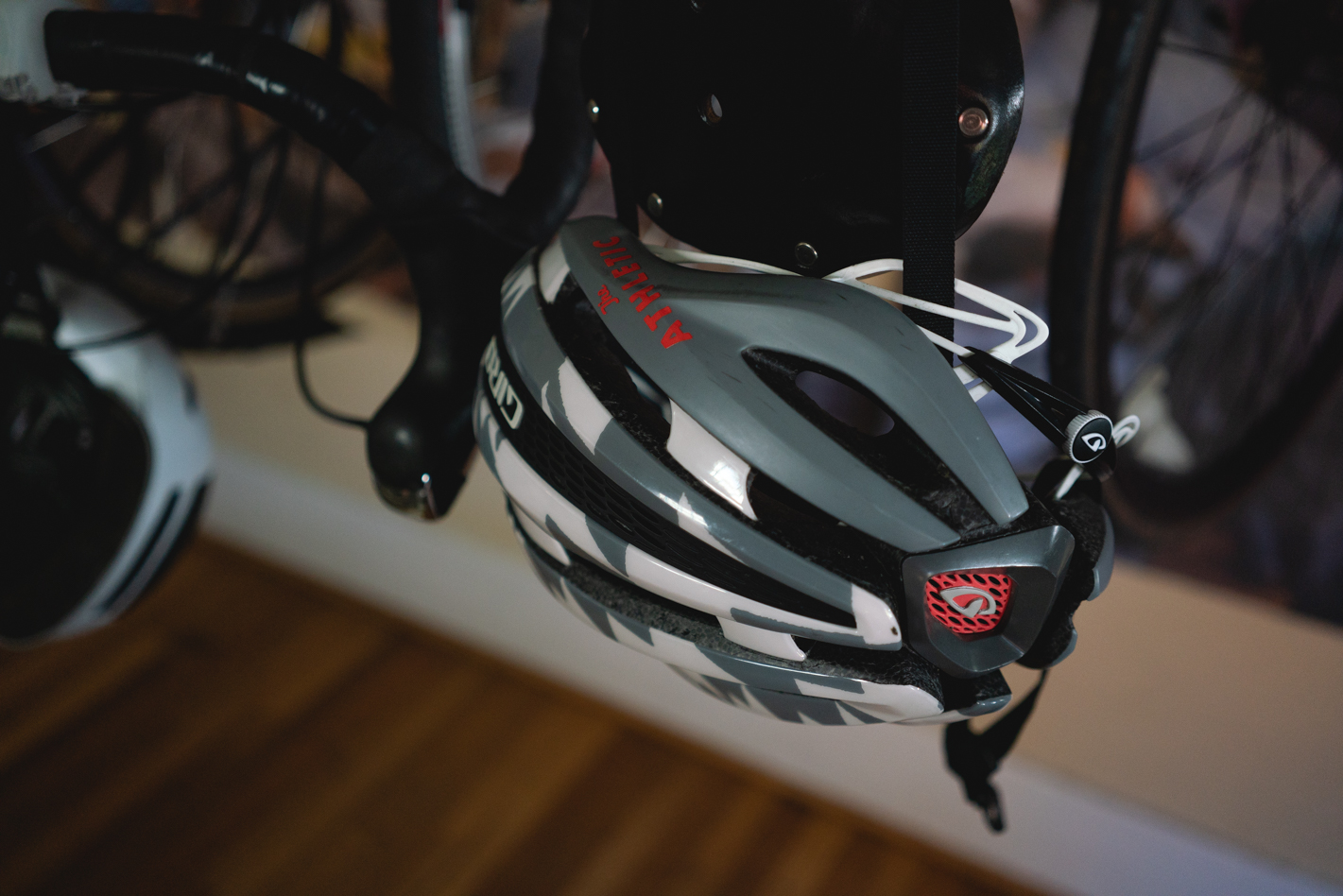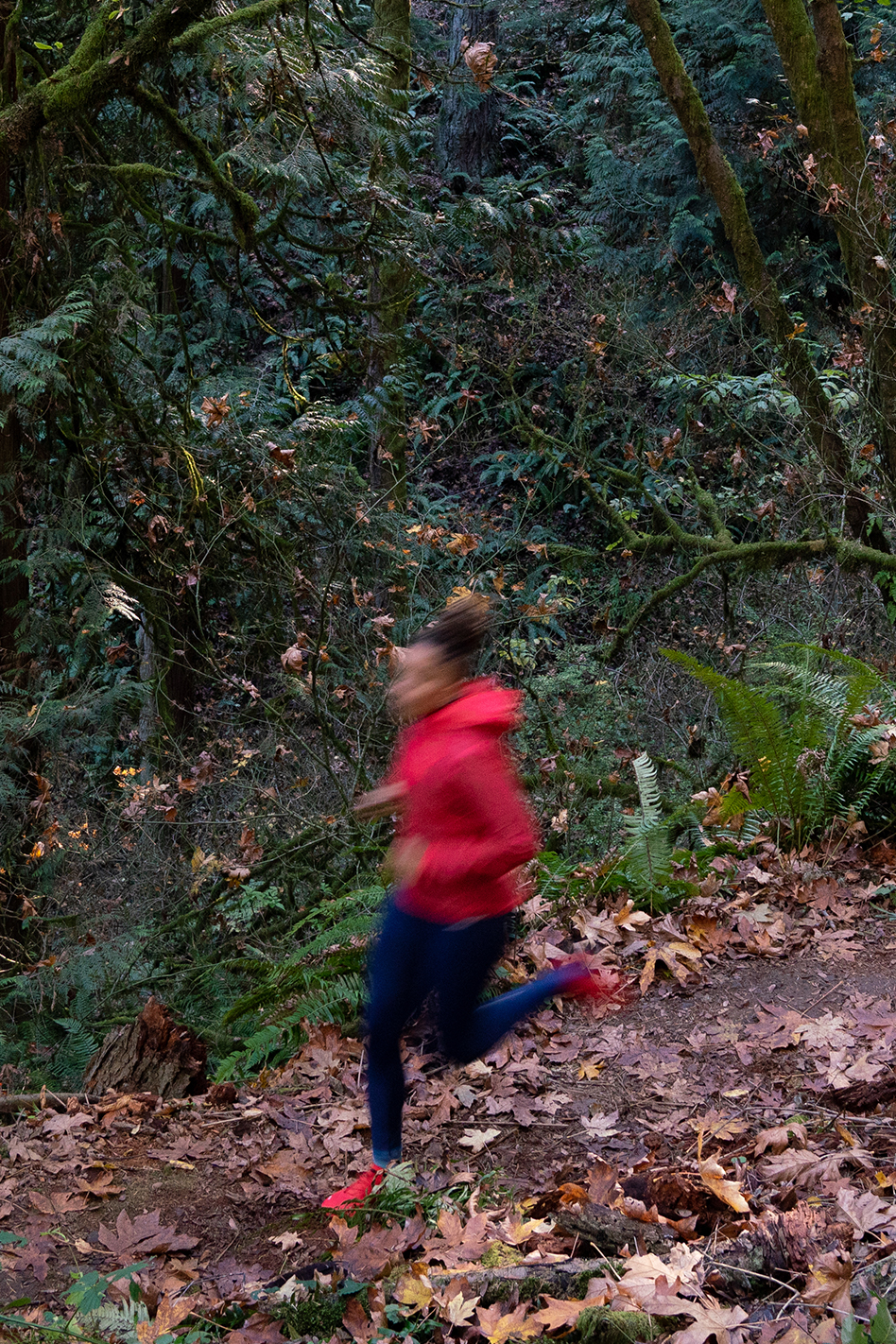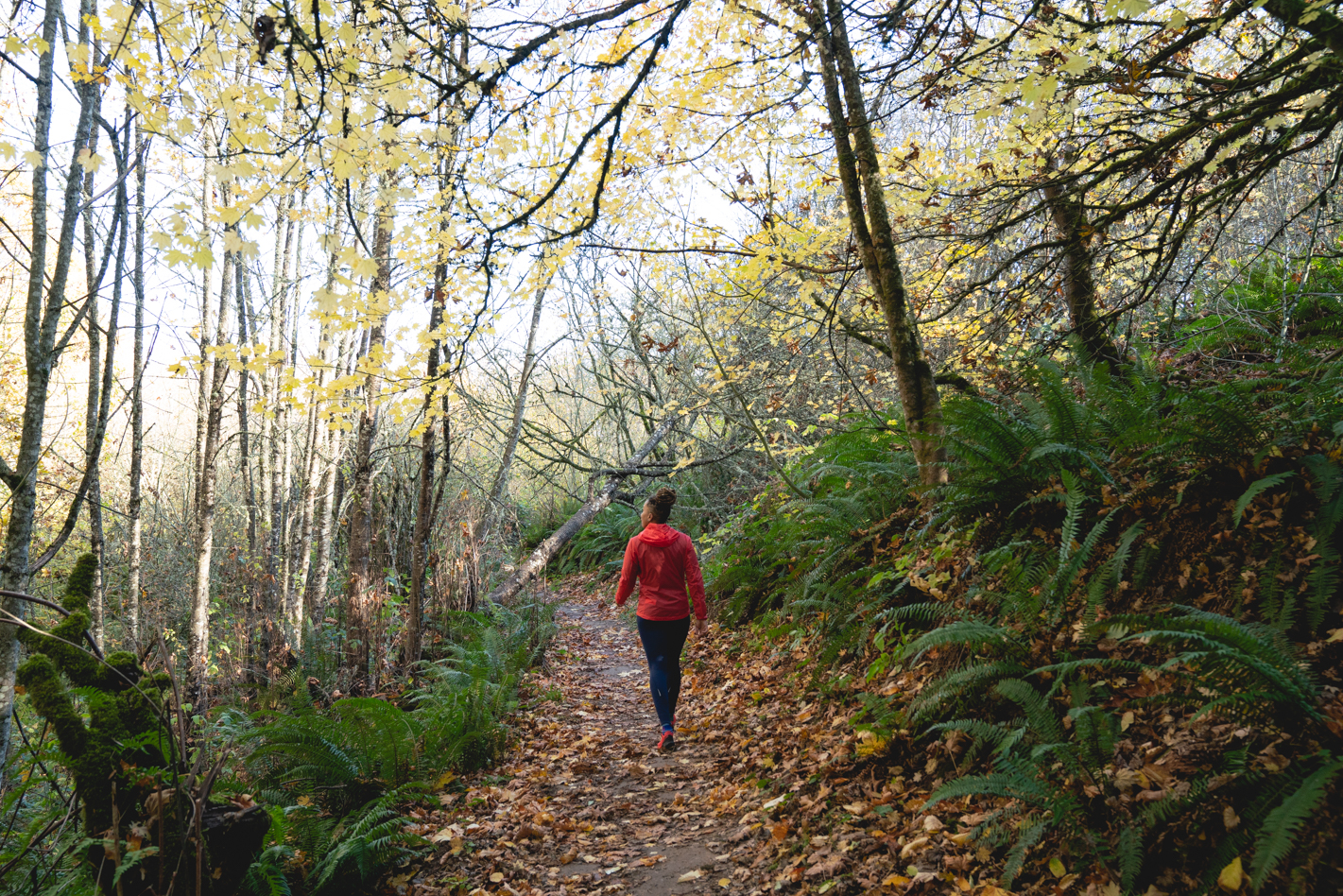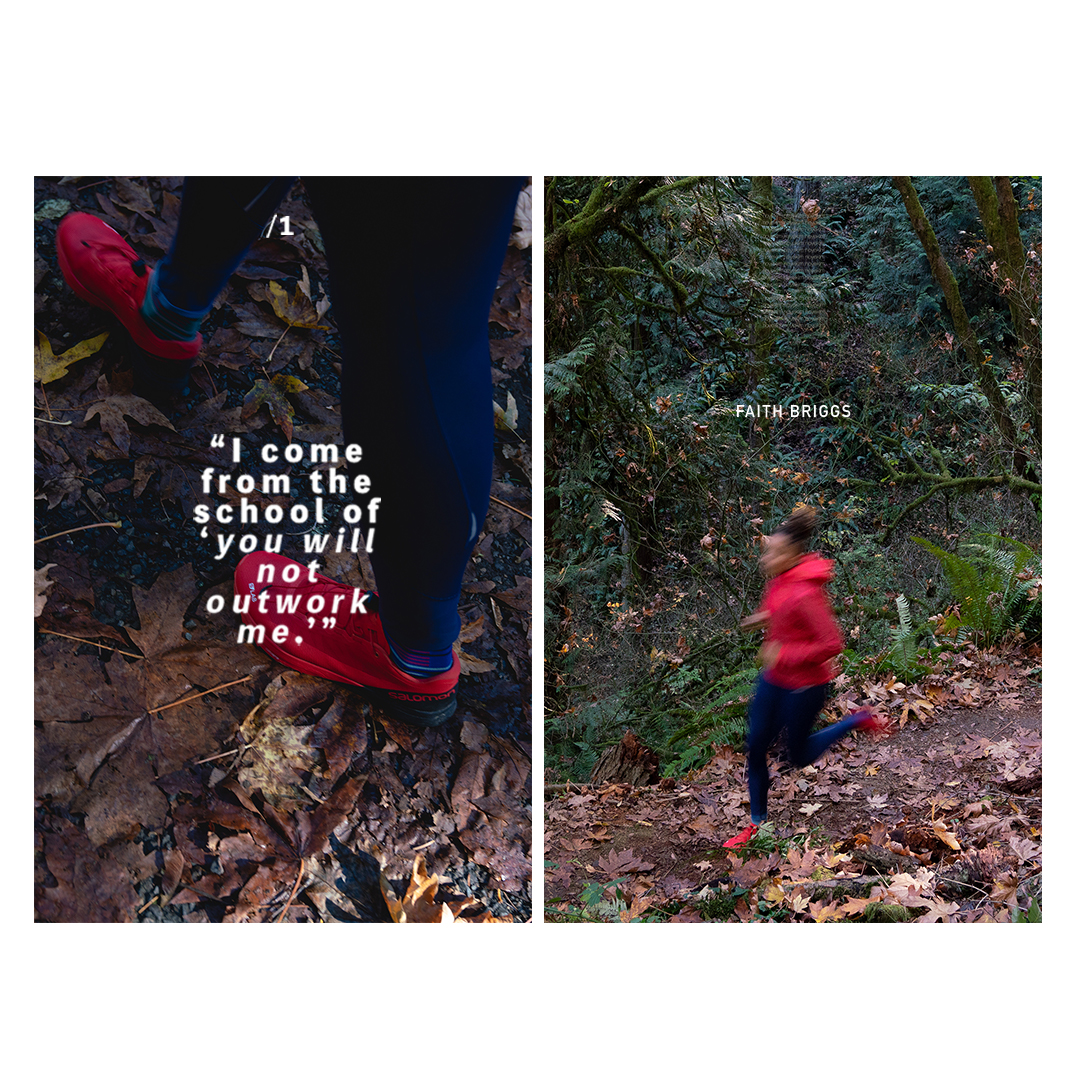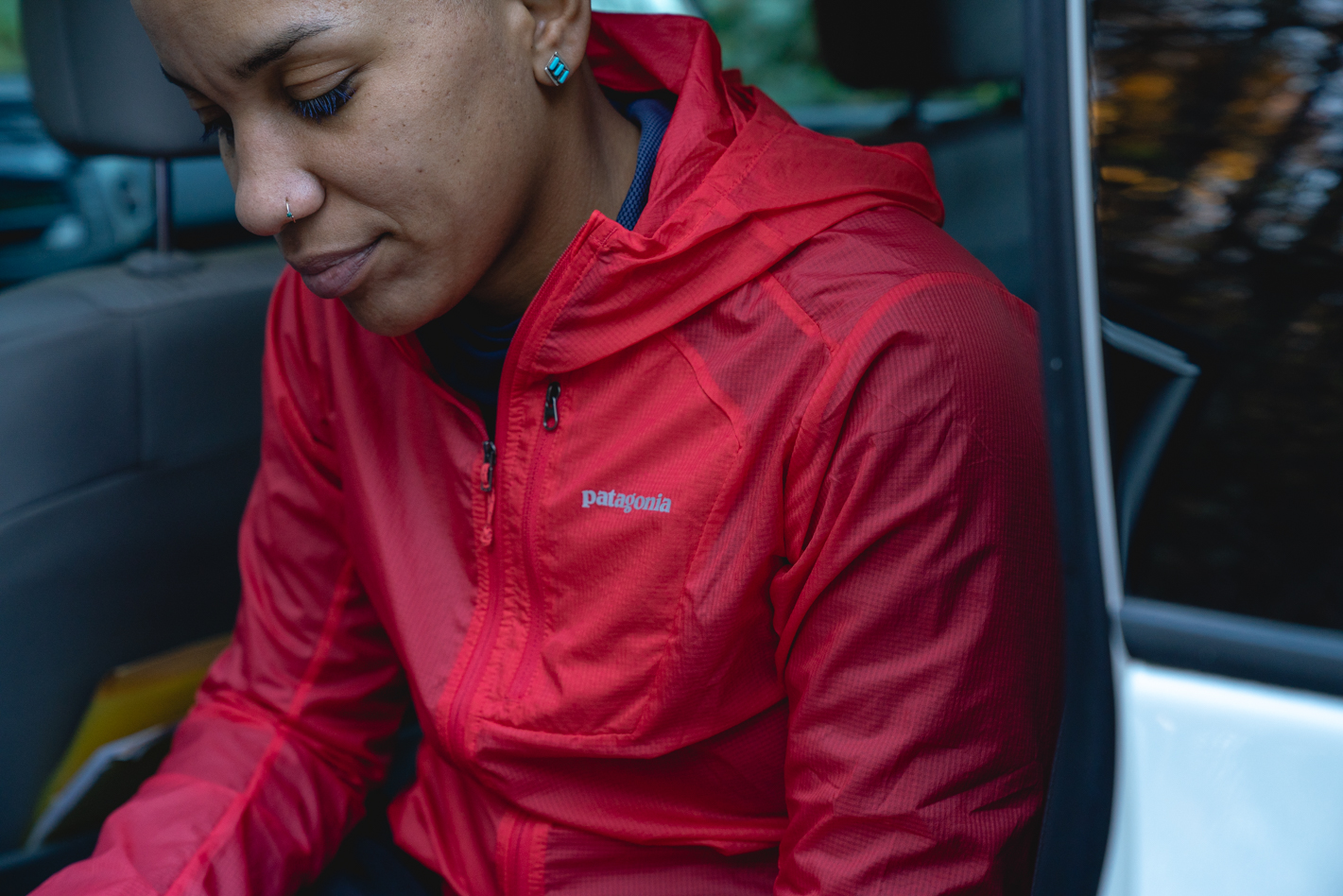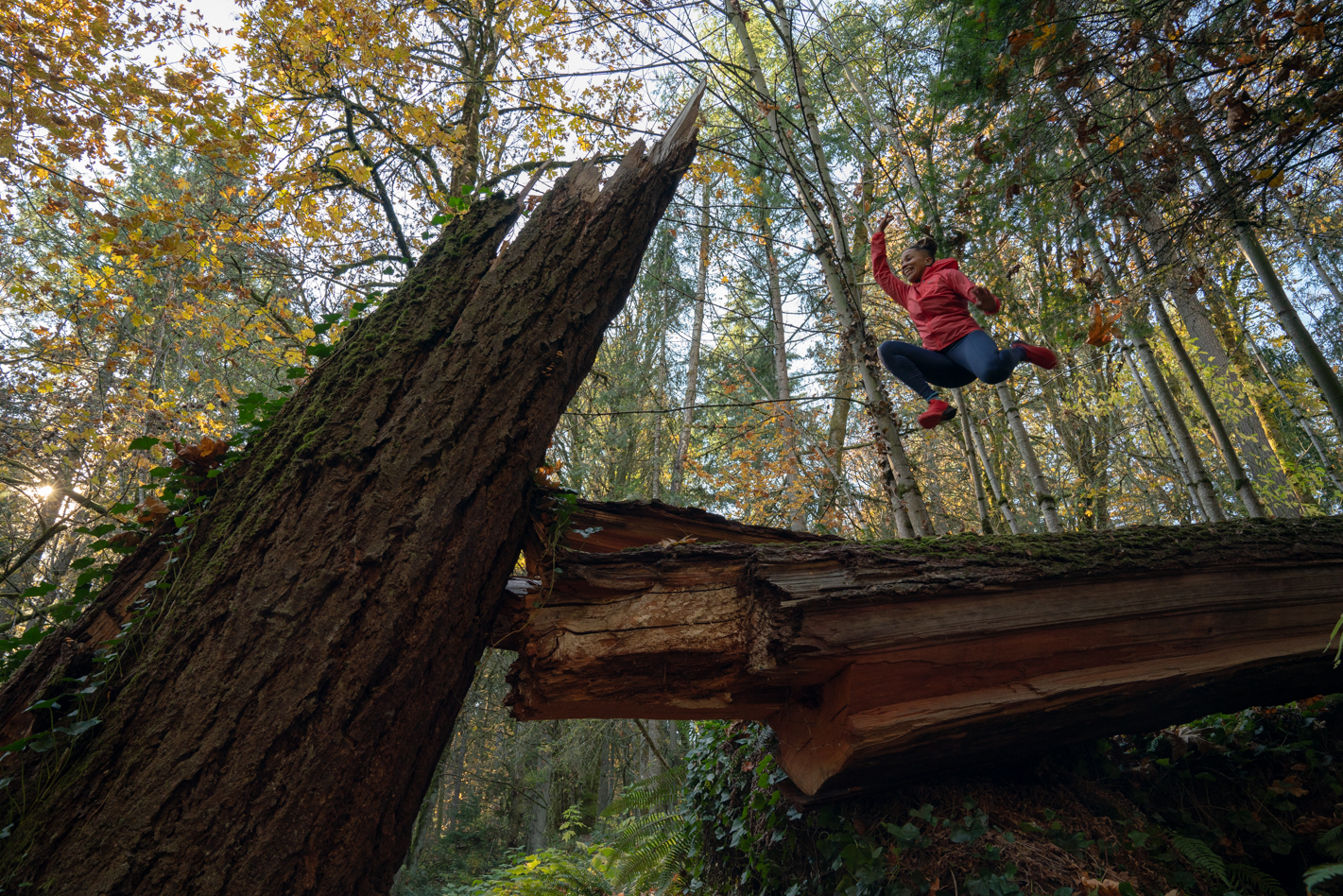Resilient: Faith Briggs
“My name is Faith E. Briggs — I’m a documentary filmmaker, a runner, and an outdoor advocate now based in Portland, Oregon.”
When you first meet Faith Briggs (she/her), it’s a coming-home like experience. There’s a familiarity and ease there; a natural comfort and warmth that Faith brings even though you haven’t yet breached the frontier between stranger and friend.
Faith is modest in her approach to both life and people. Through her sincere style and approachability, her always stoked mannerisms and happy face, it’s easy to feel like you’ve known her your entire life. One moment she’s laughing with you about some random meme or puppies she wants but can’t afford, and the next discussing with you intensely about the politics, policy, and legacy of how women of color are underpaid and undervalued in society.
For the photos in this interview, we spent the day before her 30th birthday hanging out. Just hanging out. After breakfast from Chef Faith, we went for a trail run with friends and co. (Kendra, Rey, and pup); got some donuts, ate some bomb vegan ramen, and then celebrated her bday at her house with hella tacos and friends.
When I say that Faith herself feels like you’re coming-home, it’s because it’s true. Faith is inviting, honest, and in many ways the old friend we all can chat about everything with and talk about nothing to. And yet — her easygoing persona isn’t something to be taken for granted; it really only speaks to her humility. In her work, she’s worked as the Director of Toughness for Columbia Sportswear; she graduated from Yale University and works as a documentary filmmaker (see her latest, Brotherhood of Skiing); ran with Black Roses NYC and still pounds trails daily; and now serves as the Tactical Operations Producer for the nonprofit Soul River Inc. Her warmth is only a testament that Faith is a cool combo of humble badass.
In the interview below, we chat through some of her experiences as a biracial woman of color, as an athlete and creative who has faced injury and disappointment, and as a human being who, through humor and a positive attitude, always keeps her head up.
Faith sips some coffee before the early morning run.
MAE: Let’s start off with something simple. What are some things you do for fun?
FB: Ha! Talking about what you do for fun is always so weird — cause I’m like “uh, I know have fun! I have fun! But hm, fun to me. I mean as a runner — I think you’ll understand — people are always like ugh “why do you like running?” and I’m like “how do you not like running? Running is the best thing in the world!”
So yeah — I love running. It’s the thing in my life that I find I have the most control over sometimes. I do have a focus on productivity so being able to zone out IS kinda like fun? Yeah — I’m a project based person so in my free time I would say I love hanging out with friends and spending the weekend trying to get at least one nice trail run or hike with folks in. That’s really great. Otherwise I do like creating and thinking about projects, so I think *laughs* that’s fun for me!
MAE: That makes sense. If you’re working all the time, for a lot of people if you break it down, fun is being able to zone out.
FB: Totally.
MAE: What was the first sport you ever did, or maybe one of your earlier memories?
FB: One of my early memories? My dad was helping my sister get ready to tryout for the track team and I would have been (that’s my older sister, Charity) probably around 9 or 10. I was at the track too and I was just like “ima run a 400!” and my dad was just like alright go for it. So I took off!
I was pounding away and my dad says he was watching, going “Oh my god, this girl is going to lose it — she is NOT going to keep this pace up.” I was chuckin’ along — toom toom toom toom toom — and he was surprised that I was still going — like “she’s doing pretty good — what is she doing!” You know and then I come through, I hit the 300 mark, and I fall apart. I hit the wall hard. I think I managed to finish but I was lying on the ground afterwards and my dad was laughing at me and was stoked about it. The excitement about doing something hard and having my dad be proud of me I think is one of my earlier memories in sport.
MAE: What got you into running? Was there a definitive moment that made you want to pursue it?
FB: I come from a running family; it was kind of about family pride to be a Briggs. Which is a complicated thing I guess cause I’m biracial — my mom’s white, my dad’s black — and we didn’t grow up near either side of the family. Partially running and being a Briggs was a way to feel connected to the black side of my family and knowing that my dad was a runner, and his brothers were runners, and my uncle still had a shot put record at the Newburgh Free Academy and when I met the coach from NFA, he had been my dad’s relay brother. So track was just something that was talked about, always watched at my house. I think also that pride and excitement I felt going to Charity’s track meets encouraged me to do it too.
MAE: What did you study at Yale?
FB: Double Majored in African American studies and Film Studies.
On route to Forest Park | Chinook Territory. Oregon.
MAE: You focused a lot on representation and narrative from the beginning. Doc on the film side. Why?
FB: My parents put a lot of effort when we were younger into talking about race and appearance and how we show up because a lot of time people would be looking at my parents. In the late 80s, early 90s people would be side-eyeing my mom, saying stuff to my dad. I would see that and not really know how to contextualize it. They realized with my sister, “oh snap!” They were gonna have to talk about this race stuff a lot sooner than they had thought, so when I showed up they already had all of these books.
My favorite was Black is Brown is Tan by Arnold Adoff. My mom actually sent me the old school copy that I grew up with recently.
I had a lot of stuff like that. All the Colors of the Race was another one. But I think because of that and because I worked at the summer camps and saw how much our kids were soaking up media — you know I had 4 year olds who knew how to drop it like it was hot — but they probably weren’t going to be able to access some of the worlds I had access to. You know I’ve been obsessed with quotes for like ever — so I printed a bunch out on colorful paper and put them all over my walls when I was in boarding school. I was accessing knowledge, particularly from WOC that were helping to empower me. I knew that my kids weren’t ever gonna get that. They didn’t have access to the kinds of places that would give them that kind of thinking. But what if I go into media? They have access to that. That’s not locked up in an ivory tower. So that’s how I found myself studying film.
“There’s something about seeing what black people can do, how nothing is given to us and then we make everything from it and then people want what we make. People want to be like us, people want to wear what we wear, and talk what we talk, and sing what we sing — and what we are doing is often taking scraps to make magic.”
MAE: “Spending time with black folks outside of the context of America was really important and empowering.” How so?
FB: For me, being a young black woman in the United States, I’ve always seen my community as the black community. While I’m so proud and happy to be biracial (black), a lot of hard truths come along with that reality. I come from a historically marginalized community that is still plagued with very real issues related to economics, health, and self-esteem because of the continued legacy of racism. Sometimes, often, it feels very heavy and overwhelming. Meeting black folks in Panama and Honduras, having folks assume I was indigenous to these places, it expanded my idea of community beyond the borders of the United States. That has always mattered to me, it has made me feel that the fight for equity and equality and true freedom is one I’m engaged in with a bigger team, a bigger force, than I was able to recognize previously.
MAE: As someone who isn’t white-passing, what’s been your experience?
FB: I’m white on Tuesdays.
HA! Shoutout to mom. Haha just kidding. Sorry, mom. I have dreads now and I’ve had them for 10 years but when I was younger I had really curly hair, people thought I was Dominican.
I think that being biracial really has made me comfortable with living in this liminal space. Even the fact that if you put black and white together you get grey — I’m not grey right? I don’t know when but at some point in my teenage years I was like “I am not grey”. Like this was some kind of revelation to me. I can exist between worlds. I’m f****** magical. This is really cool.
It’s obviously some combination of my parents putting books about being biracial in my hands before I could read and then when I went to boarding school, I had the right support. My dad made it into an anthropology experience for me in many ways. He was like “You are there to learn the nonchalance of wealth”. He was like what is that? What is it, the confidence that comes from knowing that you’re gonna have a job when you graduate, knowing that there’s gonna be help from home, knowing that there’s a different kind of confidence that comes from coming from money. It makes you shake hands differently, it makes you speak differently, makes you navigate the world differently — he said go learn about that, essentially. So I found it very interesting to move between different worlds. And thankfully I had track — I had immediate community…
I ended up being president of the school, I was president of multiple clubs, captain of multiple sports, I partially had this “do things in spite of” mentality, which luckily I’ve come somewhat away from because it’s really tiring to always be trying to prove that there should be a black woman president of the Hotchkiss School and stuff like that.
So now I’m much more able to do things I love because I love them versus because I think I have to prove something. I know how to navigate historically white spaces — that is a skill that I learned in high school and in college. And it messes with you sometimes. I know that I have educational privilege, right — I know that the way I dress, the way I speak, allows me to get the jobs that I’ve had in spite of being this brown chick with dreads and a shaved head and tattoos…
But I know that I’m getting to a point where I’m doing that [code switching] less and that’s exciting — you have to deal with this! I’m not talking like this anymore.
I’m a little more unapologetic than I was.
MAE: As an athlete and as a creative, you’re always dealing with uncertainty. How have you approached it?
FB: As an athlete, I’ve approached uncertainty with training and false enthusiasm — fake it til you make it goes really far. My coach used to say “False enthusiasm goes a long way, Briggs”, when I would show up not stoked about practice. Also, for competition, if you’re uncertain, you’d better be confident. You can try, try hard and work hard. I also come from the school of “You will not outwork me.”
As a creative — when people are talking about your work and ask you “Who’s your audience?” I’m like: “It’s me!”
And they hate that right? You’re not supposed to say that; that’s not how you’re supposed to be. I don’t care, my audience is me so other people don’t really need to like the art that I’m putting out. I love when it resonates with other people but if I didn’t create the work I’m creating I would die inside so it’s not really for other people — it’s for my outlet. So yeah, that’s the answer. Hopefully it resonates with other people.
MAE: In a way you’re saying, you need to be okay with yourself at the end of the day. So if you aren’t producing what you want to be seeing at the end of the day, whether creative or not, is it worth it?
FB: I value passion and people over most things, so if I’m not working passionately in the service of people, then no, for me, “it” isn’t worth it.
MAE: You choose to be hopeful — where does that come from?
FB: A lot of it comes from watching my mom. When I was little, I didn’t understand why my mom worked at a Ponderosa and my dad was, meanwhile, in a PhD program. I found fault with my mom for that. I’m embarrassed to say that but that was the case. I didn’t understand that my mom had put her education on hold, that she was working night jobs so that she could take care of us and help out my dad — and once I started realizing — oh: my mom went back to undergrad when she had 3 kids and was working at a bowling alley and she’d come home smelling like other people’s cigarettes and then go back to school the next day. She was stressed out and studying and was one of the oldest students in her classes and I can’t imagine now — that she got her Masters also and became a teacher — in spite of all that. She’s an incredible teacher. Let’s say she’s doing a rainforest unit in class she goes “Oh! Sorry I’m not gonna be home til 8 because I’m making a paper mâché tree! And right now I’m stuck on the macaws!” We’re like “mom! What are you doing?!” She’s such an overachiever. Even through repairing relationships with her family, she was disowned when she married my dad, and even through all of our moves which weren’t about her career, she was always just a solid rock. An optimistic solid rock.
I think that fact alongside learning my history. There’s this incredible book called The People Could Fly, that is titled based on a legend about black resilience. There’s something about seeing what black people can do, how nothing is given to us and then we make everything from it and then people want what we make. People want to be like us, people want to wear what we wear, and talk what we talk, and sing what we sing — and what we are doing is often taking scraps to make magic.
MAE: Community seems to have made a huge impact in your life. Whether it was a temporary one from summer camp or a school year one from track.
FB: Community is one of the most important things to me. I think in general establishing relationships with people is how we grow to be better individuals — within a healthy community at least. Community allows for accountability, growth, and support. I’m definitely a social person, while I love and need my “me time,” so I love spending time with all kinds of folks, hearing their stories, delving into what we have in common, learning about their life experiences. I’ve always said one of my favorite things to do is to cook with friends; that’s something we can do together. I think of community as a way of showing that you are invested in people’s well-being, it’s a way of reminding myself that people come first, before other pursuits, money, accomplishments. People have to come first for whatever else I’m doing to really matter to me, so I think that’s why I focus so much on building and seeking out community.
“I think that being biracial really has made me comfortable with living in this liminal space. Even the fact that if you put black and white together you get grey — I’m not grey right? Idk when but at some point in my teenage years I was like: “I am not grey”. Like this was some kind of revelation to me. I can exist between worlds. I’m f****** magical. This is really cool.”
MAE: What does running mean to you?
FB: Running is so much to me. It’s one of the things that has given me confidence and taught me determination. In some of my toughest times it’s how I clear my mind and regain my joy. Through running my body and my mind show me that I’m capable of more than I thought, more than I knew. Throughout my life, running has been my most constant friend. I’ll do it until I can’t anymore and then I’ll probably still try. You never regret having gone on a run, you can’t stay mad while running, and you can’t avoid yourself. I guess it helps me face the world and feel ready for whatever is next.
MAE: Going back to October: We were talking about injuries and you mentioned that it doesn’t matter where your level is at — the important part is being okay with it. Can you elaborate a little more?
FB: Almost two years ago I was in peak shape: I was running with Black Roses NYC, I was so excited about where I was at, where my body was at, and for me a lot of where my confidence comes from is that and being able to perform. Then I got this incredible opportunity to work for Columbia Sportswear to be the Director of Toughness, like I’m gonna be doing crazy adventuring! And then I got out here and they gave me 5 weeks to prep for my first ultra. I ran myself into the ground. I got injured. So I went into the race limping, ha. It was a 3 day stage race in Argentina. And I’m doing the first day — 20 miles — I’m limping and I’m crying on the trail — I was like I can’t do this I can’t get through this, people are going by me like “Buen ritmo, buen ritmo!” I called my coach from Argentina — I was crying — he was like LISTEN: sleep on it. Make the call tomorrow. You don’t have to do this.”
Photo Courtesy of Cam McLeod. Faith keeps up a smile during her race in Argentina (as referred to in the interview)
And then I called my dad and at one point I was like “People don’t even know I’m a runner!”
He was like “Faith…you guys used to come home from track meets, having got 3rd, and you’d be all mad about it. Think about the people that never make the relay — think about your teammates who, when it’s the 4x4 time, they stand up and they round the track and cheer for you like it’s their race. You need to find out what makes them come to practice every day. Your ego is what’s telling you ‘people don’t even think I’m a runner’.
And I was like…damn…why is my dad always RIGHT!
Photo Courtesy of Cam McLeod.
It was funny cause this guy must have heard me crying in my tent (cause all the athletes sleep in tents each night before the next race day) and there was this guy and he was like, “Hay que disfrutarlo!” You have to enjoy it. And he was injured too and he had come to the race — he had already paid for it — and he was going, in Spanish “Hay que disfrutarlo. I’m injured, I’m out on the trail I’m making people laugh, I’m making people smile, I’m giving them what I can give them you know?”
And that was so amazing. The next day I woke up like let’s just go have fun. I was running with these two old guys — I’m still in touch with them — but you know I hung out with people. We were taking selfies when we got to the top of ridges. I mean we ran together for 20 miles. I met some other dude and we ran together for a while and he was injured too. It was a really good experience in humility.
And man, I had such a good time being with people who were also just excited to just be there and see what their body was capable of doing and I’ve realized I’m not gonna be an Olympian but I am still grateful to my body because it can move me in so many different ways and bring me to so many cool places.
It’s not always easy to remember. But I think somehow realizing that…being humble is being grateful to your body for what it can do. And so often I found it can do so much more than what I thought.
By day 3 of that race I could run. I don’t know what happened. I started off and I could barely go. By mile 3 I could for the first time actually put weight on my knee. I was already 43 miles in. But then suddenly for the last 15 I could run. And I was stoked. And part of that was the lesson. I didn’t perform well but it didn’t matter.
So yeah…hay que disfrutarlo.
Outside of athletic pursuits; what about in creative work?
FB: In order to come out here [to Portland] I quit my job at the Discovery Channel. I was on a really good trajectory there. I was very excited about that work. I was focused on acquisitions, it was such exciting work with awesome people and filmmakers.
When I was leaving, my boss was basically like: you’re leaving the independent documentary community to go sell clothing. No one is going to trust the authenticity of your voice when you go into marketing. So I was really scared that by leaving I was dive bombing my career to become a filmmaker.
And yet…I am a filmmaker! I just produced and presented my first documentary at BANFF. I was standing on stage and I don’t think it was until after that moment that it hit me when I was like “Omg, once again, this happened in spite of what other people thought was possible, in spite of what I thought myself was possible.” I did think I was going to maybe ruin my career as a filmmaker and then instead I learned that I’m better at telling stories now and that there are other ways of doing it outside of the traditional path. I was ready to climb the corporate ladder. And that wasn’t — this is much more the kind of filmmaking I wanna do. Which isn’t a lesson about humility but definitely about overcoming the fear about what I was capable of doing.
A fork in the trail. Faith checks the map to make sure we’re headed the correct way.
MAE: Off of that, has it always been easy trusting in your own process and your own journey?
FB: Man…
MAE: Generally speaking, ha.
FB: I don’t know why…I think it’s because I really trust my intuition. Partially it is that I am a religious person. I go through this life with the reminder like, “God has my back. Things are going to be okay,” that kind of mentality. And…that’s hard for other people to understand but I’ve seen it in my family. Even when I didn’t wanna hear it. I’d call my mom and I’d be like I need a plan, I need a to-do list. And she’d be like — let’s pray about this. And I’m like “Mom! I need some HELP! Real HELP!” And she’d say “That’s what I’m giving you.” These days yeah, I know a lot of people have my back, help me make the right decisions and I try to stay in line with that and that helps me a lot. For our generation, religion is very difficult. A lot of things have been taken from a lot of people in the name of religion, so it's hard to sift that out and retain the things that are important to you and truly fuel you. But, I think I’ve always felt kind of safe and confident because of that. It allows me to take leaps of Faith - ha -
But when I dropped out of grad school I was so ashamed. I didn’t tell anyone, I came home and didn’t tell anyone I was working as a barista and my friends didn’t know I was in the city. I thought I was a failure, it was hard to leave, but it didn’t feel right at film school. I’m not good at sitting — discomfort is not a problem for me — BUT if something doesn’t feel right I can’t stay with it. I can’t stay in places that don’t feel right. I’m not sure what that is.
MAE: What does it mean to be resilient as a woman of color?
FB: I think I’m still learning what it means to be resilient as a woman of color, because of course it isn’t one size fits all. I do know that in the past few years that word has taken on a whole new importance to me. Partially that’s because the first time I was really conscious of the significance of the word was when Dustin Martin, Executive Director of Wings of America, used it to talk about his work. He wants the young people that he works with to understand that resilience is a part of their legacy, a part of who they are as Native people.
I think that directly relates to how I see resiliency as a black woman. Actually it makes me think of this Nikki Giovanni quote about black cool. I just think that no matter what has been thrown at us since our very first arrivals on this continent, black women have overcome and are overcoming. That won’t stop, we’re an incredible force.
““Style has a profound meaning to Black Americans. If we can’t drive, we will invent walks and the world will envy the dexterity of our feet. If we can’t have ham, we will boil chitterlings; if we are given rotten peaches, we will make cobblers; if given scraps, we will make quilts; take away our drums, and we will clap our hands. We prove the human spirit will prevail. We will take what we have to make what we need. We need confidence in our knowledge of who we are.””
MAE: Final advice: to young folks coming up in the game, what advice would you give them on being? On how to move around this world?
FB: Such a good question. There’s people who really encouraged my workflow, you could say. For example there’s this group called Art Comes First (@artcomesfirst). They’re a rotating collective of black tailors and it’s so far from the world that we’re in but they’re like these — Sam Lambert, Shaka Maidoh, the crew from Super Duper Hats — all these incredible people that call themselves punk tailors and they’re so collaborative. There’s the guys from Street Etiquette, there’s Ouigi Theodore from Brooklyn Circus — they hang out together and they create work together and what I realized when I first met them was that they did things exactly their way and they found like-minded folks to do it with.
One time I heard Junot Diaz speak and he was like yo — if you’re in grad school for creative purpose and they aren’t paying you to be there, I don’t know what you’re doing there. He’s like you need to find a group of people that know where you’re from, who understand your stories, who understand your work, who get your background and create work with them. I’m all about working in collectives — he was like these people that you’re trying to impress they don’t know your work they don’t know where you come from and if you’re not working with people who are in a collective, they’re not gonna build you up. I found that in grad school. I had professors who were like “Maybe you should change the decade of your work because you know that kind of prejudice doesn’t really exist in the here and now.” I was like “You…are blind to my experiences.” So... while I do think that you need people who don’t agree with you as well in your life, my best possible advice is:
Don’t try to do it by yourself cause you don’t have to. Stay true to yourself because if you go on and copy what someone else is doing then you’re not gonna be changing anybody’s life or your own.
Figuring out what's important to you and working hard on that thing is the best way to do it. It's hard to deal with so many different influences— I still have that happen like I said — I'll see something on Instagram and I’ll be like oh — is that what I’m supposed to be doing? Should I be at that conference? Those people are on panels — am I supposed to be on panels? And it's like NO. Chill. Do your work. On a Saturday morning maybe I didn’t post a picture out on a hike. Why? Maybe I had a 17 y/o over at my house helping him with his college essays and making pancakes because that's what I sometimes do in my free time. And I’m really happy I get to do that and proud of that. (I work at a nonprofit with youth).
If I was doing what I thought I was supposed to be doing I wouldn’t be here. I’d be an executive at a television station in NY. Which would be awesome but where I’m at... I like where I’m at.




